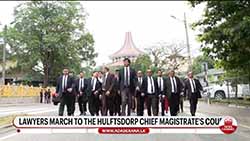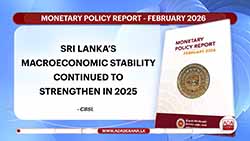Rapper/Producer DeLon is proud to rep his Sri Lankan heritage
July 28, 2015 05:18 pm
Producer, rapper and DJ DeLon might have cut his teeth at rap competitions in Compton and South Central. But he’s a son of Sri Lanka at his core.
“The kings and queens of Sri Lankan lineage has been written down and quantified over the last 4,000 years,” DeLon says, proudly talking up the island nation off the coast of India, where his family is from. “Most cultures have kings and queens, but to have it written down and quantified is a different story.”
Though born and raised in Los Angeles, DeLon’s Sri Lankan culture is what makes him a unique, next-generation member of international hip-hop culture. In today’s cultural landscape of global diversity, DeLon’s music embraces influences from R&B, hip-hop, electronic and house. He’s even fluent in Spanish and became the first Sri Lankan artist to place a single on the Billboard charts with his 2005 hit “Calor de la Salsa,” a fusion of salsa and hip-hop.
Even growing up in the cultural melting pot of Los Angeles, DeLon’s Sri Lankan heritage sometimes made him the target of racist barbs. “After high school, I ran track for USC and was around everybody black, calling me Indian and a nigga in the same breath. I was so confused, ‘cause I’m not even Indian, I’m Sri Lankan.”
Hip-hop allowed him to overcome some of those racial barriers. “One of my friends back then owned a record label called 306 Records and he’d go up to Oakland every weekend to record his friends,” DeLon remembers. “I’d be up there a lot and we would talk about ethnicity and race. We thought it was just so interesting that a form of music could bring together a Sri Lankan guy and a black guy who both just loved and related to hip-hop.”
After the success of “Calor de la Salsa,” which peaked at No. 22 on the Billboard Hip-Hop/R&B Songs chart, DeLon scored another hit with the song “Nasty Girl,” from his second album, 2008’s Unstoppable. That same year, he decided to use his music to shed light on ongoing terrorist attacks in Sri Lanka and his opposition to fellow Sri Lankan artist M.I.A., whose music and imagery supported a Sri Lankan separatist group called the Tamil Tigers, who have been responsible for many terrorist attacks.
DeLon did a diss remix of M.I.A.’s song “Paper Planes” and posted it on YouTube. Within hours, the video drew more than 100,000 user views and comments; it’s up to 2 million so far. (Earlier versions of the video have since been removed.) The story hit the online front pages of BBC Entertainment, Billboard and Pitchfork. The video was polarizing; it made DeLon both a voice of the Sri Lankan people and the target of an online smear campaign orchestrated by Tamil Tiger supporters.
With his new EP, Awake, DeLon continues to develop his voice as a Sri Lankan living in America, trying to stay true to his culture while making hip-hop with mainstream appeal. Slated for an independent release this fall on MJW Records, Awake’s first two singles out this summer, “Head High” and “Middle Earth,” start to tell DeLon’s story with his most personal lyrics yet.
“When my dad came here, he used to live on the streets,” DeLon says. “He built everything that he had from the ground up, from nothing. We used to live on Hollywood and Highland when it was a dump and [then] we moved to Pasadena. ... I was watching us move like Mario Brothers, going from one level to the next level.”
But for a young Sri Lankan kid, moving up the economic ladder sometimes brought other challenges. “It wasn’t till we moved to San Marino, around white and Asian people, [that] I started to experience racism. It was around that time that I started to feel very alone, almost like I was trudging my own path in life.”
Music became his refuge. “The first hip-hop album that I ever heard was Southernplayalisticadillacmuzik by OutKast and that first song asked, “Are you an OutKast?’ It was like, ‘Bing!’
“I come from a place where we had no running water or modern medicine,” he continues, referring to the poverty his family rose out of in Sri Lanka. “When we were kids, we’d go there and stay for months. My grandmother didn’t have a bathroom and we had to shit in the outhouse and all the electricity for the house ran on this one outlet. When I started as a hip-hop artist, this is the stuff that I would talk about. There wasn’t much of a difference from what I saw on the streets of the ghetto here and in my native hometown in Sri Lanka.”
Early in his musical career, DeLon was able to give back to his ancestral home. In 2004, a devastating tsunami hit Sri Lanka, and DeLon’s single “Jeevithe” (which means “life”) became one of the featured tracks on an official tsunami relief CD. Later, the Consul General of Sri Lanka, Dr. Hector Weerasinghe, praised him for his efforts in speaking out against the Tamil Tigers and the country’s ongoing civil war, calling DeLon an “artist of peace,” and stating that his music was “instrumental in bringing global attention to our country and our efforts to rebuild and re-establish democracy.”
Awake features a mix of funky electronic tracks, upbeat melodies and hip-hop lyrics about growing up, falling in love and chasing your dreams. DeLon feels it’s the best musical expression yet of his true self.
“The album is called Awake ‘cause I finally feel like I’m awake,” he says. “People love you for who you are, not you trying to be someone else. Being in the industry for 10 years now, I’m just like, fuck this shit, I’m just gonna do my own thing. If people like it, they like it, if they don’t, press fast forward. I don’t fucking care anymore. I don’t have the same want or need to be famous anymore. I just want to be true to me.”
Source: L.A. Weekly












